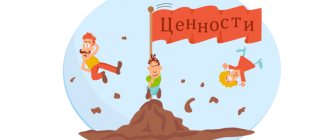- Essays
- Free theme
- The role of society in human life
Man is a social creature. Most people make friends and acquaintances from a very early age. In the beginning, we grow up in a family in which we are taken care of by mothers, fathers, sisters, grandmothers, brothers and grandfathers. We grow up watching the behavior of our family and friends as an example.
Then we go to kindergarten, because being in a group allows for faster intellectual and speech development of the child. Communication skills are developed in a gaming environment. There are a huge variety of active and calmer games for team interactions. The guys feel support from each other and this gives them a feeling of confidence.
In the school environment, the circle of communication expands. Adults often retain school friendships for many and consider them the strongest.
Next comes the university or college stage, and then work. And there are always people around us with whom we communicate. After all, there is no way to make a purchase in a store without talking to the cashier. And just going to the cinema or for a walk alone will be boring. Playing outdoor games or cheering for your favorite team alone can be very lonely.
A person is formed as an individual thanks to society, which influences his habits and behavior. For a long time, humanity has survived in the wild by uniting in communities. Together it was easier to get food and fight enemies. Over time, certain customs and traditions began to form in society. In addition, the formation of nationalities was greatly influenced by climate and population size. Speech allows us to communicate with each other.
The political situation in the country, natural disasters, and the economy of the state also affect a person. A person’s personality is formed under the influence of various events that happen in society. For example, using history as an example, we can see that wars and revolutions induce in people a feeling of struggle and love for their Motherland. In peacetime, there is a gradual development of cultural values and a large number of talented creative individuals appear. The media can simply masterfully manipulate the consciousness of people, providing information that will further spread among people and lead to the result they need.
It is difficult for a person to exist outside of society. Currently, there is not only real communication, but also the opportunity to talk on the phone and communicate through social networks. This gives you a chance to feel needed and share your impressions without even leaving home.
"Old Thought"
So, let's look at how children and adults are influenced by others. Previously, it was believed that the atmosphere in which a small person is located collectively affects his development. That is, if the baby was initially cut off from society, then he will be slightly “wild.” In addition, he will not be able to form as an individual. But what role does society play in the development of personality, according to this point of view? The answer is simple - the main one.
Without being surrounded by people, a person will never be able to become intelligent and understanding of his relatives. Unlike those who grew up in society, such individuals will seem, as already mentioned, wild. After all, from childhood people are surrounded by someone. And they absorb information from their environment like sponges. Yes, during communication a person’s socialization and adaptation to life occurs. But there is another, slightly non-standard version on this issue.
Relationship between parents and children in the family
The role of the family in personality development is important during the first year of a child’s life and subsequent years. First, parents are entrusted with the responsibility of creating conditions for his physical development. They provide food and hygiene conditions. Further interaction occurs in the following stages.
- Children begin to express needs and desires. Adults should distinguish them from whims, giving the child moral lessons about habits.
- In the second year, the child learns to walk, gets acquainted with the environment through touch, and shows curiosity. He needs to explain everything, demonstrate it clearly, answer questions, play games.
- There come times when a child needs to be taught the limits of what is permitted. Using examples from book heroes, they explain to him what to do and what not to do. Issues of moral qualities are considered, what exactly is valued or subject to censure.
In the family, the child acquires his first communication skills. The task of parents is to instill in him respect for elders, a sense of mutual assistance, and a desire to help peers. Using the example of adults, children learn how to behave in typical situations. The role of the family must be viewed not only in a positive aspect, but also as a negative factor. A good influence on a person lies in sufficient care. But the greatest harm can also be caused by relatives.
Is it that good?
So what role does society play in the development of personality, according to another theory on this issue? Let's try to figure it out.
The point is that with the development of man, his environment has constantly changed, is changing and will continue to change. True, in the modern world, the “environment” is sliding more and more downhill. Most moral values have simply already been erased. Thus, many people forget about what kind of knowledge and ideas about spiritual and moral things a child should receive. So if a child has been in an immoral society since childhood, then his views on life will be distorted. They will also be formed contrary to the universal - normal - principles of life.
So society does not always have a good influence on development. Sometimes it can turn people into a gray mass, into a real herd. Thus, you should not give an unformed person to be “torn to pieces” by those around him. For proper development, it is worth keeping him in the “right” team. One where there are still concepts of morality and principles. Now let's talk to you about when a person receives basic knowledge in order to form a personality.
What is personality
It is important to understand what personality is. This concept is often confused with the concept of individuality, especially in relation to children. Parents often say that their 4-year-old child has already formed a personality because he loves certain music. But psychologists note that the preference for certain music in children speaks not about personal characteristics, but about individuality. It also includes temperament, some abilities, etc. This greatly influences the development of personality, but is not a determining factor.
Awareness of oneself as an individual in children occurs when certain criteria are determined:
the child fully uses personal pronouns; he can describe himself, even on a primitive level, talk about his own problems and feelings; he has self-control skills. And children's tantrums due to insignificant reasons indicate insufficient personal development; The baby has basic ideas about the concepts of “bad” and “good.” He knows how to refuse what is “bad”, to sacrifice his immediate desire for the common good.
Childhood
So, what is the role of childhood in the development of a person’s personality? As you might guess, it is childhood age that plays a key role in this process. The thing is that, when born, the baby still has no ideas about life. He receives them from his parents and those around him. So, a child’s entire outlook on life is formed in childhood. During this same period, character is formed and the psyche strengthens. If something goes wrong during upbringing, it can leave an indelible mark on the child’s future life.
Thus, special attention should be paid to the staff and staff of educational institutions when sending a child to school or kindergarten. Bad company or a bad attitude can simply ruin the personality in a little person.
Formation of personality in society: arguments for an essay, social studies essay
Agents of Socialization
Definition of personality
Society educates a person’s personality according to its values, which can be different, for example, it instills a love of freedom or conservatism. If society simply interacts with an individual, but does not put pressure on him, then nothing unusual is expected ahead. A person becomes self-confident, active and free internally. If society instills conservatism, then the person will not be entirely confident in himself, closed and withdrawn. Although, family upbringing also plays an important role.
Stages of personality development
There are many examples that show the formation of personality in society. Take, for example, Victor Hugo's Les Misérables . The thief stole dishes from the priest, and then the police caught him and brought him to the victim. The Holy Father stated that he himself allowed him to take his dishes. This situation changed the thief beyond recognition, he stopped stealing and began to live like an honest person.
As you can see, the final result of personality formation can be unpredictable, because it is influenced by even the smallest things that happen in life.
A sense of responsibility helps people develop self-confidence and willingness to sacrifice. A striking example is the main character of K. Vorobyov from the work “Killed near Moscow” . Alexey Yastrebov became courageous and demanding due to constant danger. He understands very well that a real person can not only save the Motherland, but also have his own beliefs and interests. This forced him to meet the German tank halfway and defeat not only him, but also himself.
Stages of personality development Stages of personality development
Despite the fact that the formation of an individual in society is a complex and long process, the cherished end of this process is worth the time spent. Leo Tolstoy's novel "War and Peace" - had to endure mistakes, losses and a lot of experiences .
He was scattered for a long time and tried many paths because he could not understand where to move to achieve his goals. Pierre was betrayed, taken prisoner and he survived the war, but this did not break him, but on the contrary, they pushed his character to new achievements. At the end of the work, he already appears matured, settled down, and he has found his happiness in life. He created a family where everything depends only on him, and he understood perfectly what he wanted from life.
We see another good example in the work of D. Fonvizin “Minor” . Here you can clearly see how the formation of personality begins in the family. Mitrofanushka’s mother told him every day that he didn’t have to study, and that people of lower status were despicable, like slaves. This is all invested into the child from childhood and, accordingly, in adulthood he receives many bad qualities.
The history of Russia also has many examples of personality development, for example, Kutuzov. He was an excellent commander and also a wonderful comrade to his soldiers. He was also close to the people, always understanding and empathetic. That's why everyone loved him. He fought alongside the soldiers, and did not sit at headquarters. He was interested not only in Russian, but also in foreign literature. All this together had a great influence on the development of his personality.
Option 1
(401 words) As a rule, society negatively influences a person, as it imposes standards of behavior of the majority, without respecting individuality at all. People, uniting in a team, want to avoid being bothered by a unique and strong personality. It’s easier for them to adapt to a low standard, and everyone else can be forced to sink to the general level. This is evidenced by numerous examples from the literature.
So, A.P. Chekhov in the story “Ionych” presented his view on the relationship between society and the individual. The main character came to the outback to take the position of a zemstvo doctor. Dmitry Startsev was full of ambitions, hopes and good intentions. He dreamed of serving people and strived to achieve heights in his craft. However, his surroundings, consisting of boring ordinary people fixated on material values, immediately disappointed him. But Dmitry was in no hurry to adapt to him. He became a guest in the intelligent Turkin family and fell in love with Katerina, the daughter of the owners. The girl did not share his feelings, and a broken heart forced Startsev to look for another circle of friends. Gradually, wine, gambling and monotonous conversations about local gossip pulled the hero into their pool. The routine of days spent surrounded by narrow-minded and complacent philistines became a swamp for Dmitry’s ambitions and hopes. He degraded and turned into a fat, rude and greedy “Ionych” - one who corresponded to the general level. Society made him that way.
But there are also those people who resist and do not adapt to society. We meet such a heroine in the story by A.I. Kuprin "Olesya". She lived in the forest, in a kind of exile, because she was the granddaughter of a local “witch.” In Polesie, Manuilikha developed a bad reputation: due to her supernatural abilities, the woman was blamed for all local troubles. Olesya inherited this gift and was just as dangerous in the eyes of her neighbors. The inhabitants of Polesie were afraid of “witches” and were ready to punish them by force at any moment. The superstition of the peasants was also reflected in Olesya’s worldview: she believed that her abilities were from the evil one, so she did not go to church. The heroine partially internalized the prejudices of her environment, but did not submit, but opposed herself to it. She did not want to lose her gift, was in no hurry to change her lifestyle and did not need the company of anyone other than her lover and grandmother. She developed a strong and independent nature. In this example, we see that the influence of the environment has imposed certain ideas on a person, but the person is fighting for his individuality. This fight builds character and makes her stronger.
Thus, the behavioral model of society is determined by the majority, so a crowd of people is always more or less primitive. Therefore, she strives to squeeze out those who stand out and do not meet the average standard. Its influence can be called negative, since it does not elevate, but degrades the personality.
Cooperation between educational institutions and families
Family contact with the social environment is very important. With mutual cooperation between teachers and parents, getting to know the child's character will be more successful. Then the student is viewed from various angles in all available circumstances. Joint understanding, development of abilities, overcoming difficulties in behavior will help to correctly orient the little person.
There are collective, group and individual forms of such interaction. It is recommended to combine them as follows.
- It is based on a parent meeting, at which the class teacher directs the activities of parents.
- Exchange of opinions and joint problem solving are complemented by joint activities to study children's behavior.
- Then the results are analyzed, work is done to overcome shortcomings, and consolidate positive results.
Teachers play a decisive role in this contact. That is why their professional qualities are so important. Creating a favorable atmosphere of interaction will unite efforts. Parents will respond to the teacher’s desire to implement mutually beneficial cooperation. They will also show interest in joint educational activities.
Family traditions as a means of spiritual and moral education
When considering the role of family and parents in the formation of personality, we must recognize that what is acquired in the family is retained throughout life. The institution of education in this case is of incomparable importance. The foundations of personality are laid in preschool age, and by the beginning of education it is more than half formed. What family traditions influence spiritual and moral development?
- The success of family education depends on the degree of preparation for the process of both parents.
- Participation in a child’s life, involvement in his interests and communication with peers is an important aspect, helping in adaptation to the world around him. As well as orientation in terms of involvement in activities.
- The example of family relationships should help to examine reality in a positive light.
- The traditional goals and objectives of the family are emotional support and satisfaction of the need for self-realization. As well as preparation for social life and responsibility.
- The psychological climate, as a result of which spiritual experiences are united, is very favorable. It creates a successful attitude towards moral values: cohesion, security, emotional satisfaction, responsibility.
Traditionally, proper education leads to the emergence of a personality adapted to society. Qualities, beliefs and behavioral factors correspond to the successful process of interaction with the environment, communication and activity.











